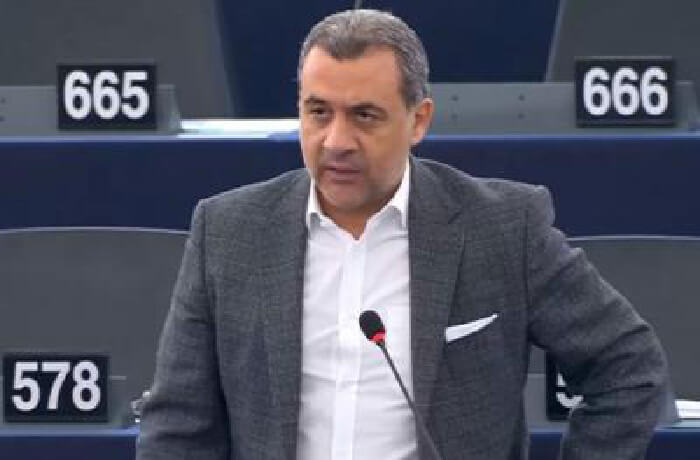Gender Equality Strategy 2020-2025: Parliament’s reaction and input
-
MEPs welcome the strategy but criticise the lack of concrete targets for 2025
-
Binding measures necessary to close the gender pay gap
-
Concerns about backlash against gender equality, notably in Poland and Hungary
Parliament welcomes the positive measures included in the EU’s new Gender Equality Strategy but calls for additional actions and specific and binding targets.
In their report adopted by 464 votes in favour, 119 against and 93 abstentions on Thursday, MEPs describe the Commission’s 2020-2025 Gender Equality Strategy as ambitious but regret that it is sometimes too vague and lacks defined targets to be reached by 2025 and clear monitoring tools.
Combatting violence against women
With regard to the Istanbul Convention, Parliament welcomes the Commission’s intention to propose measures in 2021 to achieve the Convention’s objectives in case some member states continue to block its ratification.
Deeply worried about the nature, extent and gravity of violence and harassment in the workplace, MEPs call for binding measures to define and prohibit violence and harassment at work. These include access to gender-responsive, safe and effective complaint and dispute resolution mechanisms, training and awareness-raising campaigns, and support services and remedies.
They also push for an EU framework directive to prevent and combat all forms of gender-based violence – particularly female genital mutilation (FGM), forced abortion, sterilisation and marriages, sexual exploitation, trafficking, cyber violence and online hate speech against women.
Closing the gender pay gap
In order to bridge the gender pay gap, MEPs urge the Commission to table binding measures on pay transparency as soon as possible.
In the context of the pandemic, MEPs highlight that 70% of the global health and social workforce are women, often paid the minimum salary. They call for wages and working conditions in strongly female-dominated sectors such as care, health and retail sales to be levelled up.
Countering backlash against gender equality
MEPs express their deep concern over the backlash against women’s rights in some member states, in particular regarding abortion rights and the access to comprehensive sex education in Poland, as well as the adopted reform that attacks transgender and intersex rights in Hungary. They call for the state of women’s rights and gender equality to be monitored continuously, including disinformation and regressive initiatives in all member states, and for an alarm system to highlight when rights are taken away.
Quote
The rapporteur, Maria Noichl (S&D, DE), said: “Today the European Parliament puts gender equality back on the agenda. We say ‘yes’ to a gender equal society and ‘no’ to violence against women and girls of all backgrounds. If nothing changes in the EU, it will take more than 65 years to achieve gender equality. The Gender Equality Strategy and its proposed actions are a faster route to equality between men and women. It also strengthens our position on the backlash against women’s rights taking place in several member states. Rule of law in Europe can only exist with gender equality – without it, democracy is lagging behind.”
Background
The Gender Equality Strategy 2020-2025, presented in March 2020 by the Commission, outlines a set of key actions including ending gender-based violence and stereotypes, ensuring equal participation and opportunities in the labour market (including equal pay) and achieving gender balance in decision-making and politics.
EU member states scored on average 67.9 out of 100 in the 2020 Gender Equality Index, a score that has improved by just 5.9 points since 2005. The EU gender gap in hourly pay is 16% and increases to 37% when it comes to pension income.
Improving gender equality during and after the COVID-19 crisis
-
New services essential to protect victims of domestic violence
-
Need for targeted actions to advance gender equality in national recovery and resilience plans
-
The most vulnerable groups of women must be supported
MEPs examined the impact of the COVID-19 pandemic on women and proposed measures to protect women’s rights and enhance gender equality during and after the crisis.
In a report adopted by 485 votes in favour, 86 against and 108 abstentions on Thursday, MEPs stress the need for a gender-sensitive response to all aspects of the COVID-19 crisis in order to enhance gender equality and to protect women’s rights during the pandemic and post-pandemic period.
New services needed to protect victims of domestic violence
MEPs acknowledge that the public response has been insufficient in addressing violence against women during the pandemic. They ask member states to establish safe and flexible emergency warning systems and to offer new services to assist women in contacting the police directly by phone, email and text message.
In addition, MEPs urge the Commission to develop an EU protocol for violence against women in times of crises, which would include services to protect victims. They reiterate their call that all member states must ratify the Istanbul Convention and ask the Council to add violence against women to the list of EU criminal offences. They urge the Commission to propose a directive to tackle all forms of gender-based violence.
Women hit harder by the economic crisis
Since this economic crisis affects women disproportionately, and will lead to even greater inequalities between men and women, MEPs call on EU countries to incorporate a chapter with targeted actions to improve gender equality in their national recovery and resilience plans.
MEPs repeat that working from home is not a substitute for childcare and that access to childcare services is essential. EU countries should encourage men, through incentive measures, to take up flexible working, as a disproportionate number of women are now making use of these arrangements, they say, adding that member states should fully transpose and implement the Work-Life Balance Directive without delay.
Furthermore, MEPs call on the Commission to support women entrepreneurs, including through entrepreneurship opportunities for mothers or single parents, and to improve access to loans, equity finance and microfinancing through EU programmes and funds.
COVID-19 and intersectionality
Intersecting and structural discrimination creates additional barriers and challenges, as well as having a negative socio-economic impact on more vulnerable groups of women. Appropriate measures must be developed to reflect the varying circumstances in which women find themselves. These include older women in care homes that are now virus hotspots, women with disabilities unable to access their usual support networks or maintain physical distancing, migrant women that are more vulnerable to gender-based violence, but also rural, homeless and Roma women as well as members of the LGBTQI+ community, MEPs add.
Quote
The rapporteur, Frances Fitzgerald (EPP, IE), said: ‘‘COVID-19 has undoubtedly had a differential impact on women, from the increase in domestic violence and care responsibilities to job losses. Yet men have also been significantly affected; for example, initial figures show that older men are more vulnerable to the effects of the virus. The post-virus recovery must take account of this differential impact if we are to build back better, reshaping our society to ensure that it is fully inclusive of all.”
Fauci announces US intention to resume major role in global health
Addressing the WHO’s Executive Board Meeting, Dr. Anthony Fauci, Chief Medical Adviser to the new US President, said that Mr. Biden intended to issue a directive within hours so that the country can become part of the COVAX platform to advance multilateral efforts to distribute coronavirus vaccines, therapeutics and diagnostics.
Speaking one year ago “to the day” since the United States confirmed its first case of COVID-19 infection, Dr. Fauci noted that global infections had now surpassed 90 million.
This was a “devastating number that continues to grow”, he said, while paying tribute to the scientists, public health officials and frontline healthcare workers, and community health workers who had worked “heroically” to fight the virus.
They had developed medical countermeasures “at truly phenomenal speed, adapting their responses as more is known about the virus, he said, “courageously treating the millions of people who have been stricken by this historic scourge”.
‘Committed to transparency’
Dr. Fauci noted that responding to COVID-19 and “rebuilding global health and advancing health security” worldwide, “will not be easy.”
He said the US was “committed to transparency, including those events surrounding the early days of the pandemic. It is imperative that we learn and build upon important lessons about how future pandemic events can be averted”, he added. “The international investigation should be robust and clear, and we look forward to evaluating it”.
Global health gains
Addressing the WHO executive, Dr. Fauci also announced US plans to work with other countries “to counter the erosion of major gains in global health”, specifying HIV/AIDS, food security, malaria and epidemic preparedness.
“It will be our policy to support women’s and girls’ sexual and reproductive health and reproductive rights in the United States, as well as globally”, the US official added.
In reference to existing US federal policy which blocks funding for organizations that provide counselling on abortion or related services, he explained that President Biden “will be revoking” it “in the coming days”, as part of his broader commitment to protect women’s health and advance gender equality at home and around the world.”
As a WHO member, the United States would also work “constructively…to strengthen and importantly reform the WHO”, Dr. Fauci said, helping to lead the collective effort to strengthen the international COVID-19 response and address its impacts on people, communities, and health systems everywhere.
A family of nations: WHO chief Tedros
Welcoming the US pledge to fully rejoin WHO, Director-General Tedros Adhanom Ghebreyesus said he “looked forward to continuing this partnership, as I know all [WHO] Member States do.”
Tedros extended his best wishes to Dr. Fauci, President Biden, Vice President Harris, the new administration, and the American people “as you work together to save lives and bring the pandemic under control.”
“I assure you of WHO’s continued commitment to support you with science, solutions, solidarity and service” he said.
“WHO is a family of nations. And we are all glad that the United States is staying in the family”, Dr. Tedros added.
Financial boost
The head of US delegation, Dr. Fauci also announced that his country will cease the drawdown of US staff seconded to the WHO and will resume regular engagement of US Government personnel directly and through its WHO Collaborating Centres.
In addition, it intends to fulfil its financial obligations to the organization, he said.
EHang Joins European Union’s AMU-LED Project to Demonstrate Urban Air Mobility
<div class="eh-ribbon">
Trusted News Since 1995
<span class="prof not-if-mobile-w820">A service for political professionals</span>
<span class="not-if-mobile-w820">·</span>
<span class="date">Thursday, January 21, 2021</span>
<span class="not-if-mobile-w430">
·
<a class="article_live_counter" href="/live_feed">534,863,631</a>
Articles
</span>
<span class="not-if-mobile-w550">
·
3+ Million Readers
</span>
</div>
</header>
<footer>
<div class="sitemap">
<h2 class="subheading-osc g_roboto">News Monitoring and Press Release Distribution Tools</h2>
<div class="row-fluid">
<div class="span3">
<section>
<h3>News Topics</h3>
</section>
<section>
<h3>Newsletters</h3>
</section>
</div>
<div class="span3">
<section>
<h3>Press Releases</h3>
</section>
<section>
<h3>Events & Conferences</h3>
</section>
</div>
<div class="span3">
<section>
<h3>RSS Feeds</h3>
</section>
<section>
<h3>Other Services</h3>
</section>
</div>
<div class="span3">
<section>
<h3>Questions?</h3>
</section>
<br/><section>
</section>
</div>
</div>
</div>
</footer>
<!--[if lt IE 9]>
<script src="/js/excanvas.min.js" type="text/javascript"></script>
<![endif]-->
<!-- Start Alexa Certify Javascript -->
<noscript/>
<!-- End Alexa Certify Javascript -->
<!--[if IE 7]>
<script type="text/javascript" src="/js/json2.js"></script>
<![endif]-->
European Parliament approves additional funds for most vulnerable
The European Parliament has approved amendments which will make additional funds available to support the most vulnerable in society.
The increase was negotiated by MEP David Casa on behalf of the European People’s Party and in view of the unprecedented COVID-19 pandemic.
The plenary approved amendments to the current regulation to strengthen the Fund for European Aid to the Most Deprived (FEAD) to deal with the COVID-19 crisis.
Extra funds for food and basic needs will be made available in 2021 and 2022 and no co-financing by member states is needed.
It was approved by 649 votes in favour, seven against and 31 abstentions.
Casa said that the extra funding would help those worst impacted by the pandemic, which led to lockdowns across Europe, job losses and a drastic reduction in income for many families.
“Today, I am pleased that we have succeeded in making additional funds available to support the most vulnerable in society,” he said.
FEAD provides support for people in vulnerable situations by providing finance for the purchase of basic necessities.
The changes to the current FEAD regulation will make it possible for member states to access funds made available through REACT-EU and increase the time in which this financing can be accessed so as to ensure that funds can continue to flow.
Independent journalism costs money. Support Times of Malta for the price of a coffee.
Support Us
Bad Religion Post New Song Emancipation Of The Mind
| Thursday, 21 January 2021 |














